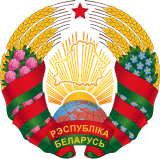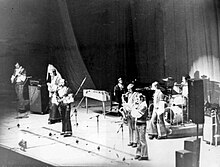Music of Belarus
This articleneeds additional citations forverification.(October 2021) |

Belarusis anEastern Europeancountry with a rich tradition offolkandreligious music.[1]The country's folk music traditions can be traced back to the times of theGrand Duchy of Lithuania.The country's musical traditions spread with its people to countries likeRussia,Canada,United States,KazakhstanandLatvia.The people of Belarus were exposed mostly to Russian pop music during this period and also after independence in 1991. In 2002, however,PresidentAlexander Lukashenkohas signed a decree requiring 50% of allFMbroadcast music to be Belarusian in origin, and since 1 January 2005 the rule has been even stricter (75% of music broadcast each day must be Belarusian). However, it does not regulate the language of the songs, so most[citation needed]of the music which is broadcast is still in Russian.
| Part ofa serieson |
| Belarusians |
|---|
 |
| Culture |
| By regions |
| Closely related peoples |
| Religion |
| Languages and dialects |
| Topics |
Documentation of its music stretches back to at least the 15th century. Prior to that,skomorokhswere the major profession for musicians. Aneumatic chant,calledznamenny,from the word 'znamia', meaning sign or neume, used until the 16th century in Orthodox church music, followed by two hundreds of stylistic innovation that drew on theRenaissanceandProtestant Reformation.In the 17th century,Partesnoe penie,part singing, became common for choruses, followed by private theaters established in cities likeMinskandVitebsk.
Music of Soviet Belarus[edit]

In the 20th century, the firstsecondary educationinstitute in Belarus was founded (1924) and the firstoperas.PopularSoviet Belarusian musicwas composed by several bands, many of whom performed Belarusianfolk music.Folk rock actPesniary,formed in 1969 by guitaristVladimir Mulyavin,toured over Europe.[citation needed]
Modern Belarus[edit]


Belarus gained independence after the fall of the Soviet Union and new bands appeared, includingN.R.M.Modern pop stars includeBoris MoiseevandLyapis Trubetskoy(though they tend to orient themselves towardRussiaand Russian speakers). Around 2002 a new generation of electronic bands appeared, including the groups likeRandomajestiq,Dreamlin.
Rock music of Belarus arose in Perestroika times. Bands likeBi-2(currently living in Russia),Lyapis Trubetskoy,were founded in the late 1980s or early 1990s. The Belarusian government has attempted to limit the amount of popular music aired on the radio, in favour of traditional music of Belarus. These restrictions have encouraged some Belarusian bands to sign up to Russian labels and to tour more in neighbouring countries.
The tradition of Belarus as a centre of folk and folk rock music is continued today byStary Olsa,BristeilandKriwi,among others.
In 2003, Belarus took part in theJunior Eurovision Song Contestfor the first time. Their participant, Volha Satsiuk, came in 4th place. In 2004 Belarus made it to the semifinals of the regularEurovision Song Contest.The country was represented by a duoAleksandra and Konstantin,who failed to reach the final. They won theJunior Eurovision Song Contest 2005the following year, withKsenia Sitnik's song, 'My Vmeste'.
The Belarusian authorities promote folk or "Slavic" music at the country's top musical event—the state-sponsoredSlavianski Bazaar in Vitebsk,an annual pop and folk music festival inVitebsk.The biggest festival of Belarusian rock music takes place outside of Belarus, inGródek,northeasternPoland,a small town some 40 kilometers east ofBiałystok—the center ofPodlaskie Voivodeship,which is inhabited by a 200,000-strong Belarusian minority. The festival, held in July every year since 1990, is organized by the Belarusian Union of Students (BAS) in Poland. The official name of the event is the Music Festival of Young Belarus orBasovišča.
Patriotic songs and hymns[edit]
References[edit]
- ^Pichura,G (1966)."The Origins of Renaissance Polyphony in Byelorussian Greek-Rite Liturgical Chant".Journal of Belarusian Studies.I(II): 92–102.Retrieved21 May2024.
- ^Which song should be the national anthem of Belarus? (Якая песня павінна быць гімнам Беларусі?)(in Belarusian)
